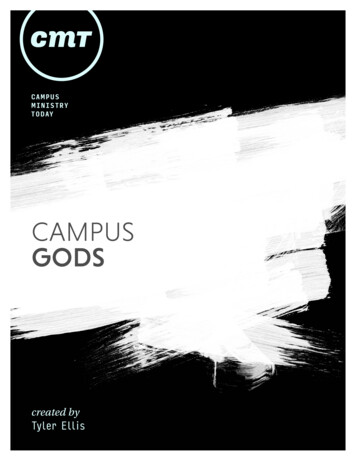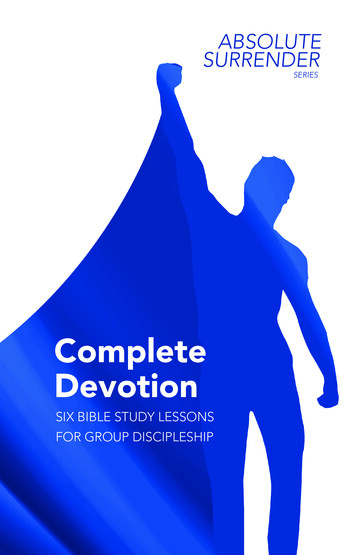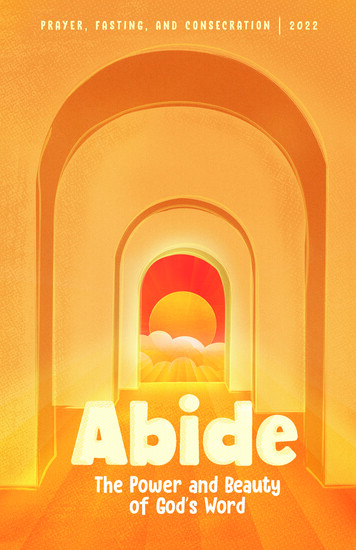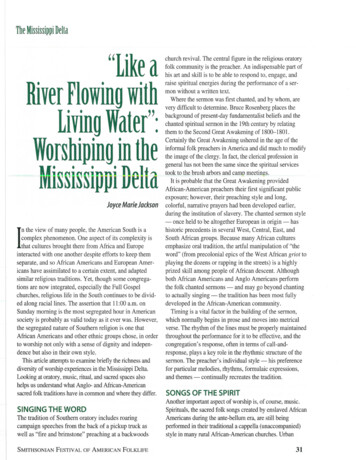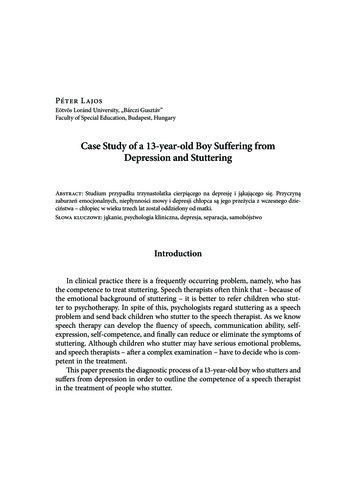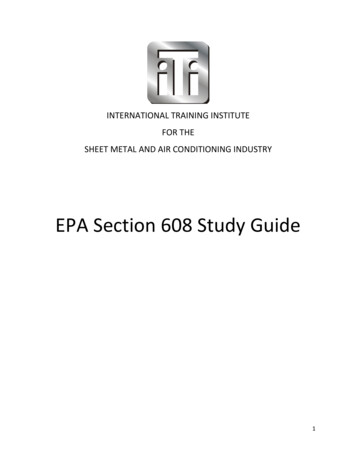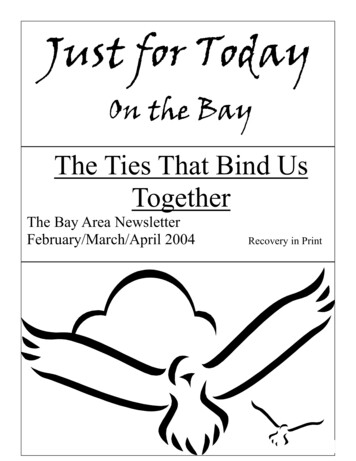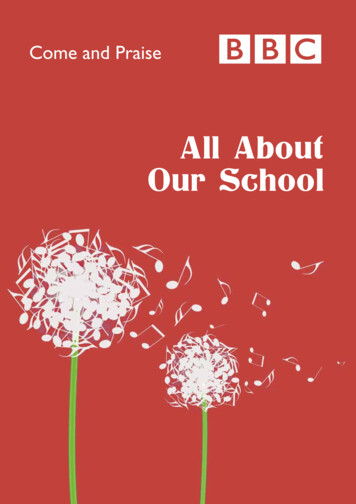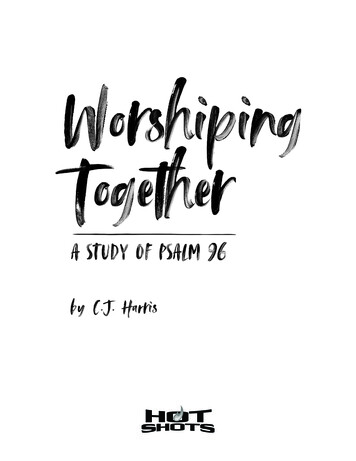
Transcription
Worshiping Together: A Study of Psalm 96Written by C.J. Harris, PhDCopyright 2018 by Positive Action for Christ, Inc., P.O. Box 700, 502 W. Pippen Street, Whitakers, NC 27891.positiveaction.orgAll rights reserved. No part may be reproduced in any manner without permission from the publisher.Printed in the United States of AmericaPrint ISBN: 978-1-59557-326-1PDF ISBN: 978-1-59557-327-8Edited by Christa Lord and Duncan JohnsonDesign by Shannon BrownPublished by
Table of ContentsIntroduction. . . . . . . . . . . . . . . . . . . . . . . . . . . . . . . . 4Lesson Format . . . . . . . . . . . . . . . . . . . . . . . . . . . . . . 5Course Objectives . . . . . . . . . . . . . . . . . . . . . . . . . . . . 6Overview . . . . . . . . . . . . . . . . . . . . . . . . . . . . . . . . . 6Lesson 1—What in the World Is Worship? . . . . . . . . . . . . . . 7Lesson 2—The Elements of Worship. . . . . . . . . . . . . . . . . 14Lesson 3—Why Should We Worship?. . . . . . . . . . . . . . . . 19Lesson 4—How Should We Worship God?. . . . . . . . . . . . . 25Lesson 5—Who Should Worship God? . . . . . . . . . . . . . . . 32
IntroductionWhen you hear the word worship, what do you think about?For some, the word evokes images of lofty cathedrals echoing with the whisperedprayers of believers. Others may imagine an earnest pastor pleading with his congregation to behold their God. And still others may think of a band on stage, leadingthe congregation in a praise chorus.Across time and place, the form of worship has varied as much as the content ofworship. What ties these forms together? And are some forms closer to true worshipthan others? How can we know when we have truly gathered to worship God?Historically, the Christian church has outlined worship according to an acceptablestandard of practice. It has produced resources such as liturgies, books of writtenprayers, and scheduled Bible readings to guide believers. Some Christians, fearing thatformalism might rob worship of its true meaning, shied away from those practicesin favor of their own standard of corporate worship.Others have overreacted, rejecting every element of formalized worship while encouraging various forms of unconventional worship. While every human approachto worship has shortcomings, a philosophy of anything-goes worship ignores Paul’sadmonition in 1 Corinthians 14:26–33. God is not a God of confusion; therefore,corporate worship services should reflect His orderliness.In this 5-lesson study, we will study Psalm 96 verse-by-verse to learn about truecorporate worship. After defining worship, we will explore the elements that constitute corporate worship, the right reasons for worship, and the attitude that enablestrue worship. In the final lesson, we’ll consider our place in creation’s symphony ofworship to the Creator.4
Lesson FormatGod’s Word is the primary catalyst for our spiritual growth. And as God teaches us Histruth through His Word, He does so in a way that captivates our attention and opensour understanding. Just as Christ illustrated His teaching with tangible objects—acoin, a tree, or a sheep—you can use illustrations to cement biblical principles inthe minds of your students. As you teach, instead of simply talking about how God’sWord reveals our heart (cf. James 1:22–25), bring a mirror to show your students.Hot Shots encourage interaction between students and teacher through exercises,handouts, and lively illustrations. Use the suggestions provided in each lesson, butfeel free to enrich the lesson by using your own ideas.Each Hot Shot lesson follows the same format.The Warm-Up introduces the lesson topic to your students throughactivities such as songs, games, handouts, and discussion questions.The Bridge transitions from The Warm-Up to the main text of Scripture for the lesson.The Content introduces and expands the main points. Throughout thelesson, you’ll use handouts and discussion questions to help studentsinternalize what they’ve heard.The Closing concludes the lesson by reviewing the main points andapplying them to your students’ lives.Handouts may be copied for church use. They are also available as a free PDFdownload on the Worshiping Together product page at positiveaction.org.Before Each Lesson . . .1. Read through the lesson and take note of the Lesson Aim, Objectives, andany preparation needed for creative teaching segments.2. Adapt the lesson if necessary. Determine ahead of time if you’ll need to modifyteaching methods or activities to fit your equipment or facilities.3. Plan your schedule for class time. Each lesson can be taught in 30–45 minutes,but feel free to shorten or lengthen the lesson to fit your needs.4. Be enthusiastic! Excitement on your part will help cultivate your students’interest. If you don’t feel that one of the teaching ideas or Warm-Ups providedwill excite your teens, modify it to fit your group.5
Course ObjectivesThis study will . . . Define worshipNote the elements of worship found in Psalm 96Examine the motivation for worship given in Psalm 96Detail necessary attitudes for true worshipDiscuss how all things, both animate and inanimate, give worship to GodOverviewLesson 1: What in the World Is Worship?Aim: To define worship and provide an overview of Psalm 96Text: Psalm 96Lesson 2: The Elements of WorshipAim: To recognize the elements of worship given in Psalm 96Text: Psalm 96:1–3Lesson 3: Why Should We Worship?Aim: To explore the reasons for worship given in Psalm 96Text: Psalm 96:4–6Lesson 4: How Should We Worship God?Aim: To examine the attitude that should pervade all true worshipText: Psalm 96:7–9Lesson 5: Who Should Worship God?Aim: To recognize the worldwide scope of worship directed to GodText: Psalm 96:10–136
L E S S O N1What in the WorldIs Worship?When we create something, we usually have some goal in mind for ourcreation. We create art to convey some message or compose music forothers to enjoy. Designers and engineers construct devices to simplifyour daily tasks, communicate with others, entertain, and make us moreproductive.This desire to create reflects God’s own nature and work of creation. He,too, creates with purpose, as we see in His creation of humanity. Genesistells us that God did two special things when He designed the first manand woman. He created them in His image, and He gave them purpose—toworship Him.Aim: To define worship and provide an overview of Psalm 96Objectives: Students will . . . Define worship as “humble recognition and appreciation ofGod’s worth, resulting in awe and exaltation.” Explain the purpose of worship List the four questions of worship relating to Psalm 96Text: Psalm 96PreparationLessonIn this lesson, we’ll look at what it means to worship. To lay a foundationfor this study, we’ll survey Psalm 96 and study the psalmist’s invitation toworship the Lord. We will also develop a functional definition of worshipto reference throughout the course of this study.Begin by singing a song together about worshiping God. If yourgroup is uncomfortable singing, play audio or video of otherssinging.Discussion: Why is worship important to Christians? (Answersmay include it’s a part of church; it honors God; it encourages us.)You will need . . . Lyrics to a song aboutworship, or audio or videoof a song about worship(example: “O Worship theKing” by Robert Grant) Handout 1.1(make several copies, onefor each group) Handout 1.2(one copy per student) Pens or pencils7
These things make worship important to us, but the greatest reasonis that worship makes up part of our being—who we are as humans.God designed us to worship Him. So if worship is a central partof our being, we ought to understand first what worship is, andsecond, how to worship.Maybe you’ve never thought much about this topic. Or maybeyou think worship is just the part of a church service in whichpeople play music and the congregation sings together. But worship, asdefined by the psalmist, encompasses much more.The word worship appears over 180 times in the Bible—and that numberdoesn’t include similar words such as praise, exalt, and sing. Clearly, Godconsiders worship an important subject, and He desires us to understandmore about it.So let’s begin by answering the question, “What is worship?”Defining WorshipThe English word worship is a shortened form of “worth-ship”. It denotesactions or words that ascribe worth to a person, object, or organization.Very simply put, the words we say and the things we do reveal what wevalue in life.The words translated as worship in the Bible provide a more concreteillustration of ascribing worth. The literal meaning of both the Hebrewword shachah and the Greek word proskyneō is “to fall on one’s face andgive homage.” These words convey the image of someone lying prostrateon the ground to bestow honor on someone else.In Exodus 34:8, God revealed His glory to Moses. How does Moses respond?Read Exodus 34:8. Moses physically bowed his head toward theearth and worshiped God.Not every instance of worship in the Bible includes bowing, but each doesportray attitudes of humility and reverence.For the sake of this study, we will use the following definition for worship.Worship is humble recognition and appreciation of God’s worth,resulting in awe and exaltation.Discussion: Discuss this definition of worship. Have the studentsgive some examples from both Scripture and modern day. Notethat humility is included as part of the definition because pridemakes worship self-focused (“See what a good worshiper I am!”)instead of God-focused.8
Worship of God is revealed through our actions, words, and thoughts aswe glorify Him. Basically, what we do reveals how much we value God.Worship can be public or private, corporate or individual. In our studyof Psalm 96, we will focus on public, corporate worship—acts of worshipintended to direct both participants and observers toward God.Created to WorshipWe have an innate need to worship something. This natural desire showsup in the way we interact with others and how we prioritize our activities.We sin when we try to fill our need to worship with something otherthan God.How does our need to worship show up in everyday life?Handout: Divide the teens into groups and hand out copies of“Created to Worship.” Direct each group to work together andlist 4–5 things that people worship besides God.Discuss their responses, namely how people’s actions revealwhat they worship. Answers may include the following points. Happiness and pleasure—People live to have fun. They spendtheir free time partying. Youth and beauty—People spend a lot of money and timetrying to lose weight, dress fashionably, and take picturesof themselves to meet a cultural standard of beauty or tolook young. Culture—People spend inordinate amounts of time trying tostay in touch with cultural references and movements. Somepeople obsess over art, music, and performances. Heroes and celebrities—People follow the personal livesof famous figures, dress like them, and buy their products. Education—People may view education as the answer to allof the world’s problems, or exalt science over faith. Sports and competition—Many people religiously follow sportsteams or players, continually checking stats and watchinggames. Nature—Some people rely only on natural remedies for illnesses, or try to find peace and spiritual experiences onlythrough nature. Power—People may pursue corporate positions to feel powerful. Some may bully others to make themselves feel in control.9
It’s easy to see what we worship by looking at how we spend our resources—our time, money, energy, and thoughts. We naturally pursue whatever wethink will grant our desires; but in reality, only God can satisfy our needs.Let’s look at what the Bible has to say about our natural desire to worship.The First Two Commandments (Exo. 20:1–6)God delivered an extensive set of commands to Israel through the Law,but He condensed their essence in the Ten Commandments. God devotedthe first two commandments to instruction about worship. God knowsthat much of our suffering and disobedience to Him comes from ourdesire to worship something else, and that we need guidance to worshipas we should.First, God issues the command to worship only Him. He tells us not haveother gods—that is, any object of worship—in place of Him. Second, Heinstructs us not to create or bow down to them. In Hebrew, this phrasemeans worship. God knows that in our fallen state, we naturally seek outand worship false gods.Altars, Temples, Synagogues, and ChurchesEverywhere in Scripture we find people—both believers and unbelievers—building structures to use for worship. As early as Genesis 4, we see Cainand Abel bring offerings to God (vv. 1–5). Noah’s first act after leaving theark was to build an altar to God and offer sacrifice to Him (Gen. 8:18–20).Numerous people in the Old Testament built altars to worship God.Solomon built the Temple to replace the Tabernacle constructed by Moses in the wilderness. In exile, God’s people established synagogues. Andafter the resurrection, Jesus’ followers crisscrossed the world establishingchurches. These structures and organizations served as places for peopleto worship together.Discussion: What non-religious buildings and gatherings canbecome places in which people worship something other thanGod? (Theaters and stadiums can be great opportunities for relaxation, but they can also become places where we gather to“worship” our favorite actress or sports team. Colleges providea wonderful setting for learning, they can become temples devoted to human wisdom.)Created for His Glory (Isa. 43:6–7)In Isaiah 43:6–7, God tells us why He created us.Read Isaiah 43:6–7. God created us to give Him glory. And whenwe worship Him, we give Him glory.10
John emphasizes this truth in Revelation 4:11, where he says that Godcreated all things for His own pleasure. And Paul closes the first half ofRomans by declaring that everything is intended to glorify God forever(Rom. 11:36).The Four Questions of WorshipLet’s read Psalm 96 together.Read Psalm 96. This psalm answers four major questions aboutworship. We will briefly look at the questions today and thenspend our next four sessions answering them.What Constitutes Worship of God (vv. 1–3)?The psalmist begins by calling us to engage in worshipful actions. Thoughthe writer mentions only a few activities, worship includes more than justsongs and prayer.Why Must We Worship God (vv. 4–6)?God’s command is sufficient to motivate our worship. However, thepsalmist offers us additional reasons.How Must We Worship God (vv. 7–9)?God values the attitude and manner of our worship as much as ouractivities of worship. Here, the psalmist addresses how to appropriatelyworship God.Who Should Worship God (vv. 10–13)?Finally, the psalmist lists those who should worship.Handout: Encourage the teens to read through Psalm 96 severaltimes this week. Hand out “Four Questions” and instruct them toanswer the questions on their own as they read. You might askthem to share some of their thoughts during the warm-up in thenext four lessons.Worship is humble recognition and appreciation of God’s worth,resulting in awe and exaltation. God created us to behold Him andHis glory, and in turn, let that recognition motivate our humblepraise. Unfortunately, our sin nature turns our gaze away from Godand encourages wrong worship. We need the grace of God and thepower of the Holy Spirit to worship the Lord as He commands.Discussion: Ask for any final questions. Then close in prayer,asking God to help the group worship Him publicly this week.11
HANDOUT 1.1Created to WorshipWorship is a recognition and appreciation of worth which results in awe and exaltation.God designed humans to have a relationship with Him, and worship is an integral part of thatrelationship. But what about people who don’t know God? What do they worship? List at least4 things that people worship besides God. Discuss how their actions reveal what they worship.(For example, many people worship wealth. In order to get more money, they may steal fromtheir employer or family.)Permission to copy this page granted for church use. Copyright Positive Action For Christ, Inc. P.O. Box 700, Whitakers, NC 27891
HANDOUT 1.2Four QuestionsRead through Psalm 96 each day this week. As you read, take some time and answer the fourquestions below.What constitutes worship of God (vv. 1–3)?Why must we worship God (vv. 4–6)?How must we worship God (vv. 7–9)?Who should worship God (vv. 10–13)?Permission to copy this page granted for church use. Copyright Positive Action For Christ, Inc. P.O. Box 700, Whitakers, NC 27891
Text: Psalm 96 Lesson In this lesson, we’ll look at what it means to worship. To lay a foundation for this study, we’ll survey Psalm 96 and study the psalmist’s invitation to worship the Lord. We will also develop a functional defi
